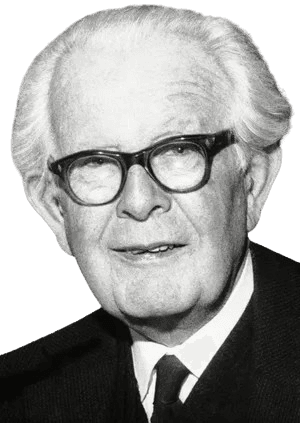Life and achievements
Early life
Jean Piaget was born on August 9, 1896, in Neuchâtel, Switzerland, to Arthur Piaget, a professor of medieval literature, and Rebecca Jackson, a mother who encouraged her child's intellectual curiosity. From childhood, Piaget had an early exposure to academic life, and this, together with his love for nature, put him on a science-leaning path right from childhood. Piaget had already contributed scientific papers on molluscs when he was a teenager, indicating his brilliance. His experiences in natural science made him expand his focus on the construction of knowledge, which became the focus of his career.
Piaget went to the University of Neuchâtel, where he was awarded a doctorate in biology in 1918. Upon graduating, he went to Paris to join Alfred Binet in intelligence testing. That was when Piaget developed an interest in the mistakes made by the children on these tests, realizing that young children made similar errors that other children and adults did not make. This observation made Piaget conclude that children's thoughts were qualitatively different from those of adults, hence laying the background for his future work on cognitive development.
In the early years of Piaget's academic life, he was a combination of biology, psychology, and philosophy. His passion for learning how children acquire knowledge led him to a lifelong career of studying cognitive development, a field he explored through experimentation, theorization, and observation of children, including his own.
Legacy
Jean Piaget's work has revolutionized developmental psychology and the field of education. He gave the world his theory on cognitive development, which was in contrast with other theories that saw children as recipients of knowledge from adults. However, Piaget argued that children build their knowledge through interactions and experiences, a concept that revolutionized education practice worldwide. He introduced the idea of genetic epistemology, which explains how knowledge develops by focusing on the interaction of biology and the environment.
Piaget's work was not limited to psychology only. It can be considered the basis of the constructivist learning theory, in which students are actively encouraged to learn by questioning, exploring, and constructing their knowledge. Some educational practices include inquiry-based learning and developmental readiness, which can be attributed to Piaget's work. His idea that children should find ideas for themselves rather than being told directly still motivates teachers.
Piaget's influence is also expressed in the broad scientific world. Some of his research methodologies, such as clinical interviews and naturalistic observations, are well-known research techniques in developmental psychology. Furthermore, it is possible to continue the list of areas where Piaget's impact can be traced, including epistemology, philosophy of science, and educational theory. He continued to practice these disciplines until he died in 1980, and his contributions to psychology and education are still felt today.
Milestone moments
Aug 9, 1896
Birth of Jean Piaget
Jean Piaget was born in Neuchâtel, Switzerland, to Arthur Piaget, a professor of literature, and Rebecca Jackson, a member of a French noble family.
His parents supported his learning, especially in the natural sciences.
Since childhood, Piaget has been fascinated with biology, which formed the basis of his ideas about human cognition.
In his childhood, Piaget had a particular interest in molluscs, and by the age of 15, he had published several scientific articles.
These early experiences in research set the stage for his future career in psychology and epistemology, in which he would apply the scientific method to the study of children's thinking and learning processes.
His childhood curiosity developed into a lifelong philosophy of how he sought to gain knowledge.
May 15, 1923
Valentine Châtenay and Marriage as well as Birth of Children
In 1923, Piaget married Valentine Châtenay, with whom he had three children.
His teaching experiences with his children would play an essential role in Piaget's subsequent investigations of cognitive development.
He applied his family life as a subject and observed how his children tackled problems, acquired new knowledge, and engaged with their surroundings.
This was a productive stage in Piaget's life regarding research since he had made some discoveries.
Studying his children, he developed his concepts about the stages of cognitive development, one of the main aspects of his further theories.
His personal and professional life were closely connected during this period, and he produced some of the best theoretical work.
Jan 19, 1936
Growth of Cognitive Development Theory
In 1936, Piaget formalized his theory of cognitive development, proposing that children move through four stages of intellectual growth: sensorimotor, preoperational, concrete operational, and formal operational.
This revolutionary theory overturned prior theories that believed children's thought processes were merely inferior to those of adults.
Piaget's theory also emphasizes that children are active builders of knowledge through their experiences.
His work proved that each stage corresponds to a qualitatively distinct form of thinking and children's growing cognitive development.
This theory brought a significant change in psychology and education, proposing that children's learning should be based on their development level.
Sep 19, 1955
Creation of the International Centre for Genetic Epistemology
In 1955, he established the International Center for Genetic Epistemology in Geneva, an organization focused on developing knowledge.
It developed into a multi-disciplinary research and study centre, attracting scholars worldwide who wanted to know how people learn and organize information.
This was one of the significant achievements in Piaget's career since it enabled him to have a formal setting where he could research genetic epistemology.
With the centre's help, Piaget introduced his theories concerning knowledge development as a synthesis of psychological, biological, and philosophical concepts.
The centre's work made Piaget's name one of the most recognizable in developmental psychology.
